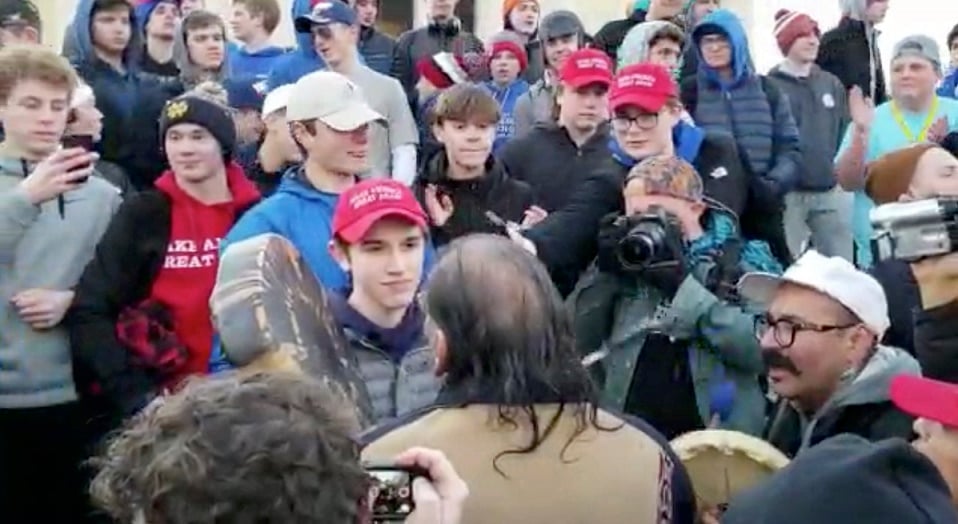CINCINNATI (CN) — Several Kentucky students involved in the infamous 2019 Washington Monument standoff cannot bring harassment claims against comedian Kathy Griffin or a New York doctor in response to tweets the students claim endangered their safety, an appeals panel ruled.
The Sixth Circuit on Tuesday upheld a federal judge’s determination that the district court lacked jurisdiction over the Covington Catholic students’ harassment and invasion of privacy claims, even in light of the fact that Griffin’s attorney filed a notice of appearance with the lower court.
A number of students sued Griffin and Dr. Sujana Chandrasekhar over their conduct on Twitter in the wake of the viral standoff between student Nicholas Sandmann and Native American activist Nathan Phillips. Although Sandmann was the focal point of the incident, he is not party to either of the suits involved in Tuesday’s decision.
In the tweets that formed the basis of the students’ suit, Griffin urged her followers to identify students involved in the incident, while Chandrasekhar tweeted a “wanted poster” that included pictures of various students.
Senior U.S. District Judge William Bertelsman dismissed both cases for lack of jurisdiction, and based his decision on the fact that neither of the defendants were in Kentucky when they published the offending tweets.
The case was argued before the Cincinnati-based appeals court last month. The students claimed the tweets represented “true threats” to their safety that granted jurisdiction to the district court. In Griffin’s case, the students also argued her attorney’s filing of a single appearance form constituted a waiver of any jurisdictional defense.
U.S. Circuit Judge Julia Gibbons, an appointee of George W. Bush, wrote the unanimous Sixth Circuit panel’s opinion Tuesday and rejected all of the students’ arguments.
“The defendants’ conduct,” she wrote, “is plainly outside the scope of the Kentucky longarm statute, since neither Griffin nor Chandrasekhar committed any act ‘in [the] commonwealth’ of Kentucky.”
Gibbons dismissed the students’ claim that the federal court could exercise jurisdiction because they suffered an injury in the state, writing that “merely causing a ‘consequence’ in Kentucky is insufficient to establish personal jurisdiction.”
“The fact that the Kentucky legislature has created a civil cause of action does not mean that every defendant is automatically subject to personal jurisdiction in Kentucky,” the ruling states. “Instead, the plaintiff must point to a specific provision of the longarm statute that confers jurisdiction in the case. The plaintiffs have confused the issue of whether they have a claim at all with the issue of whether they may subject the defendants to litigation in their chosen forum.”
Kentucky’s jurisdictional process is not the only stumbling block to the students’ suit, however, as the panel also found conferring jurisdiction would violate both defendants’ due process rights because the tweets were not “specifically directed at the forum state.”
“Neither Griffin nor Chandrasekhar had any preexisting relationship with the plaintiffs, business or otherwise,” Gibbons wrote. “They also took no affirmative steps to direct any communications to the plaintiffs or to anyone else in Kentucky, and they did not otherwise avail themselves of the benefits and protections of Kentucky’s laws.”
As for Griffin’s attorney filing a notice of appearance in the district court, the Sixth Circuit judges found a single filing was insufficient to constitute a waiver of her personal jurisdiction defense.
The appeals court expanded on its 2011 decision in Gerber v. Riordan, and reiterated that the totality of the circumstances must be considered before a determination on a party’s submission to jurisdiction is made.
“We read Gerber in context as relying on the defendants’ extensive participation in litigation, not as establishing a rule that filing a notice of appearance automatically waives the personal jurisdiction defense,” Gibbons wrote.
She went on to say that a “bright line rule” regarding the filing of an appearance form is inconsistent with several federal rules of procedure, and then applied existing case law to the suit against Griffin.
Gibbons ruled that because the comedian did not file “any responsive pleading that omitted the [jurisdiction] defense” or participate in any meaningful way in the litigation, the district court properly determined she had not waived her jurisdictional defense.
Senior U.S. Circuit Judge Eugene Siler Jr., a George H.W. Bush appointee, and U.S. Circuit Judge Raymond Kethledge, an appointee of George W. Bush, also sat on the panel.
Subscribe to Closing Arguments
Sign up for new weekly newsletter Closing Arguments to get the latest about ongoing trials, major litigation and hot cases and rulings in courthouses around the U.S. and the world.









